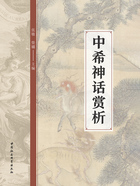
Preface
Myths are descriptions and explanations of inexplicable natural phenomena and social life by ancient ancestors through imagination. As a kind of unconscious artistic creation,myths show the strong desire,optimism and heroism of early human beings when conquering nature. It is no exaggeration to say that they have become the earliest sources of philosophical and humanistic thoughts,influencing human progress and development to varying degrees.
At the 20th National Congress of the Communist Party of China,General Secretary Xi Jinping emphasized the importance of Chinese culture,stating that
We will stay firmly rooted in Chinese culture. We will collect and refine the defining symbols and best elements of Chinese culture and showcase them to the world. We will accelerate the development of China’s discourse and narrative systems,better tell China’s stories,make China’s voice heard,and present a China that is credible,appealing,and respectable.[1]
Among these invaluable cultural treasures are Chinese mythological stories,which represent the worship of nature by ancient Chinese people and the concept of harmony between heaven and man in classical Chinese culture,and they still have irreplaceable value even today.
Compared with Chinese mythology,western mythology system is huge,mainly including Celtic mythology,Greek mythology,Hebrew mythology,Nordic mythology and Slavic mythology,among which Greek and Hebrew myths have the greatest impact upon western culture. Greek mythology is the rich heritage left by ancient Greeks who created a brilliant and colorful culture in the process of survival and development. With its centralized,complete and systematic content,Greek mythology has the most comprehensive and the largest mythological system in existence,and exerts a profound influence on the development of western language,literature,art and thought. The influence of Hebrew mythology on western culture cannot be ignored either. Being rich in content,Hebrew mythology explores the intimate relationship between all things in the universe and human emotions,interpersonal relationships,secrets of good and evil,spiritual beliefs as well as universal phenomenon of transcendence.
As our world becomes increasingly globalized,cultural exchanges between China and the West is expanding. In cross-cultural communication,it is not only necessary to learn languages,but also to understand their cultural background and cognitive patterns. This puts forward new requirements. On the one hand,“with an open mind,we should draw inspiration from all of human civilization’s outstanding achievements and work to build an even better world.”[2] On the other hand,we also need to open the door and implement “going global” strategy for Chinese culture development. Therefore,myths,as the sources of Chinese and western cultures,cannot be disregarded.
The editors have compiled this textbook Appreciation of Chinese and Greek Mythology based on the teaching practice of general education elective course.It is designed for students with intermediate language proficiency of English and strong interest in Chinese and western myths. In terms of content,only Chinese and Greek mythology are included in this textbook for the reason that although Chinese and Greek mythology embody different values,they have many similarities. For example,both mythologies are created at the most primitive stage of social development;the narrative structure of the two is relatively simple;both reflect the relationship between man and nature,man and society,as well as national spirit. Hebrew mythology differs from the two in that it places more emphasis on religious spirit,which seems to be no longer at the core of western social life,and its literary nature has attracted much more attention instead.
Therefore,editors focus on the most popular mythological stories in Chinese and Greek mythology and design the textbook according to mythological themes,namely the origin of cosmos,the origin of human beings,flood myths,water deities,myths of plants and animals,punishment myths,myths of the underworld,myths of gods of love,heroes and women in myths. The work has been compiled with care from reliable sources. Some stories,especially Chinese mythological stories,have been integrated as they are relatively scattered. Background knowledge and explanations for related literature works and culture are also given in the form of footnotes,helping the reader deepen their understanding of Chinese and Western literature and culture. The following is the general structure of each unit:
1.Introduction. This section provides a general introduction to the mythological themes and related stories in each unit.
2.Reading Material. This part presents Chinese and Greek mythological stories with the same theme.Detailed annotations are available to the reader to have a deeper understanding of the story,and questions for discussion are set at the end of each story.
3.Reflections. Including supplementary vocabulary and excerpts from classic works,this part is for the reader to review and further study Chinese and Greek mythology. Discussion tasks related to myths are designed to promote critical thinking and encourage exploration of the commonplaces and differences in Chinese and western culture.
The work now completed is offered to the public in the hope that it may render the subject of mythology more popular in universities. Among the authors to whom the editors have been particularly indebted,I may mention Anne Birrell,E. M. Berens,Edward. T. C. Werner,Emilie Kip Baker,Thomas Bulfinch,Tao Jie,Yang Lihui,Yuan Ke and Wang Lei. In addition,I would like to express my heartfelt thanks to all those who participated in the compilation and revision,especially Dr. Chai Su,Zhao Yanfeng(HUST)and Huang Jiangna(LUAS). Furthermore,I want to give this textbook to my two lovely and naughty sons,hoping that they can thrive and experience the magical and colorful world by reading mythological stories.
Zhang Min
January 3rd 2023,at Lanzhou University
[1] Xi Jinping,Hold High the Great Banner of Socialism with Chinese Characteristics and Strive in Unity to Build a Modern Socialist Country in All Respects:Report to the 20th National Congress of the Communist Party of China,Beijing:Foreign Languages Press,2023,p.61.
[2] Xi Jinping,Hold High the Great Banner of Socialism with Chinese Characteristics and Strive in Unity to Build a Modern Socialist Country in All Respects:Report to the 20th National Congress of the Communist Party of China,pp.27-28.